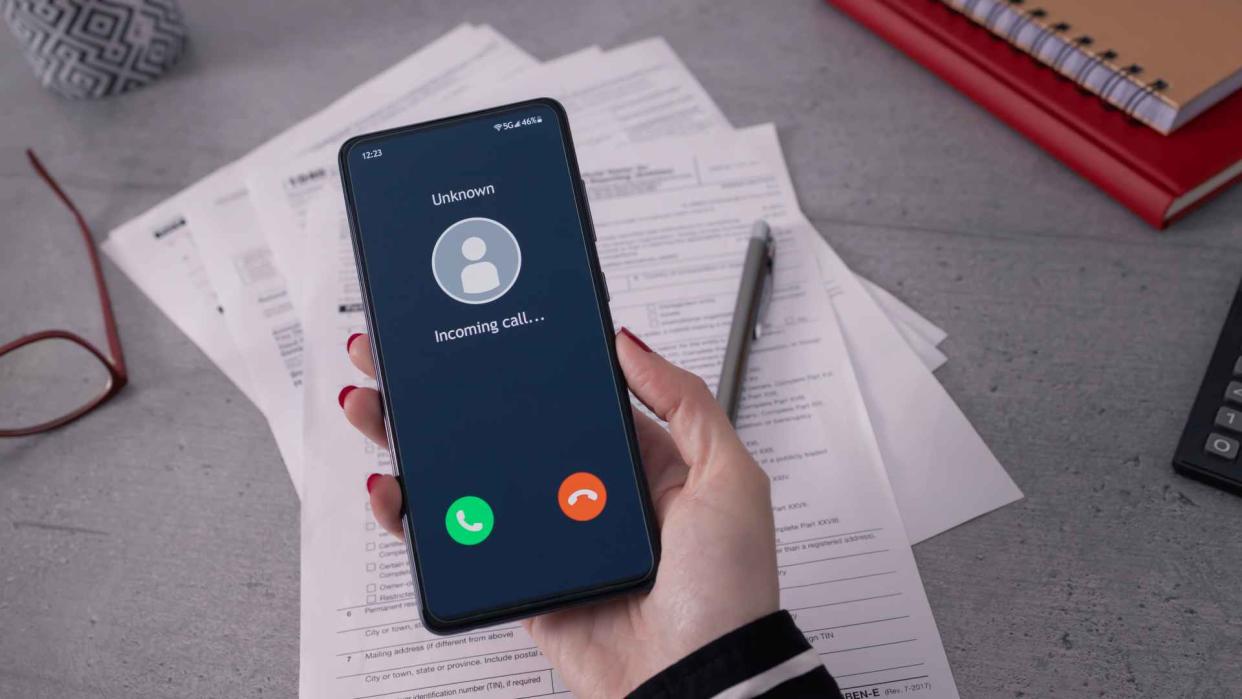350,000 Student Loan Robocalls Were Placed This Month — 8 Clues to Watch For As Scammers Try to Take Your Money

With the resumption of student loan payments set for next month, robocalls scams are surging. An estimated 350,000 such calls were placed so far this month, CBS News reported.
See: An Ancient Rule Allows Biden To Forgive Student Loan Debt — No Matter What the Supreme Court Says
Find: All of the States That Will Pay Off Your Student Loans
These are as many as in the nine prior weeks, Transaction Network Services (TNS) — which analyzes calls across dozens of carrier networks to identify robocall scams — told CBS.
“Scammers seize on chaos and confusion,” John Haraburda, a robocall data expert at TNS, told CBS. “Right now, you have a lot of activity with the new White House student loan plan, loan payments set to resume in October and the start of the school year.”
Haraburda added: “Consumers should operate under the assumption that when something sounds too good to be true, it is.”
FTC Tips To Spot Student Loan Scams
The Federal Trade Commission (FTC) already raised the alarm in July, following the Supreme Court’s striking down of President Joe Biden’s relief program.
The FTC indicated in an alert that “scammers are likely to start blasting out robocalls and texts about ‘helping’ you with your loans” and offered a few tips to spot the scams.
Never pay for help with your student loans. Instead, get help at StudentAid.gov/repay — and if your loans are private, go directly to your loan servicer.
Don’t give away your FSA ID login information.
Don’t trust anyone who contacts you promising debt relief or loan forgiveness, even if they say they’re affiliated with the Department of Education. “Scammers try to look real, with official-looking names, seals, and logos,” the FTC noted.
In addition, Ally Armeson, executive director of Cybercrime Support Network, provided steps students should take to avoid student loan repayment scams.
Contact your loan servicer: If you have federal student loans, contact your loan servicer directly to verify the status of your loans and any repayment plans or options available to you. “Your loan servicer is the official entity that handles the billing and other services related to your student loans,” said Armeson.
Review your loan documentation: Take a close look at your loan documents and any correspondence you have received from your loan servicer. “This will help you identify whether the information provided by the scammer aligns with your actual loan details,” she added.
Monitor your financial accounts: Keep a close eye on your bank accounts and credit card statements for any unauthorized activity. “If you provided any personal information to the scammer, you could be at risk for identity theft,” she said.
Update your passwords and security: Change any passwords or security information associated with your student loan accounts and other sensitive online accounts.
Report the scam: File a complaint with the Federal Trade Commission (FTC) at ReportFraud.FTC.gov. In addition, you can contact your state’s attorney general office, as they may be able to provide additional guidance and resources. “Providing them with details about the scam can help them investigate and take action against the scammers,” Armeson said.
“Remember, legitimate loan servicers and government agencies will not ask for payment upfront or pressure you into immediate action,” Armeson concluded. “If something seems suspicious, it’s better to be safe and verify the information with official sources. Always stay vigilant and protect your personal and financial information.”
Also: New Student Loan Forgiveness Rule Simplifies Process — Who Qualifies?
In June, TNS also warned that scams were on the rise, saying in a blog post that these may come in the form of phone calls, emails or text messages, while some scammers will go as far as creating a fictitious company with a website to appear trustworthy.
For reference, a TNS transcript from a student loan scam attempt is provided below.
“Loan repayment options and hardship programs. These programs are only for individuals who have less than $160,000 in federal student loan debt. Having debt obligations may cause a hardship when added to your overall monthly bills. Using our automated approval technology, you are now able to obtain enrollment information based on your current situation.”
“To use our AI automation and find the program you are approved for, you will need to write down the website. I will deliver a text message that will provide a link with the program benefits. Would you like to hear the website and receive a text message? I am sorry my responses are limited. I just need to know the answer to the previous question. Please state yes or no.”
More From GOBankingRates
Jaspreet Singh Shares 5 Ways To Grow $10k to $100k in Three Years
The Nuclear Savings Rule: 10 Frugal Living Tips from the 1950s Era
Help Protect Yourself Online: 6 Best Strategies to Safeguard Against Online Fraud
This article originally appeared on GOBankingRates.com: 350,000 Student Loan Robocalls Were Placed This Month — 8 Clues to Watch For As Scammers Try to Take Your Money
